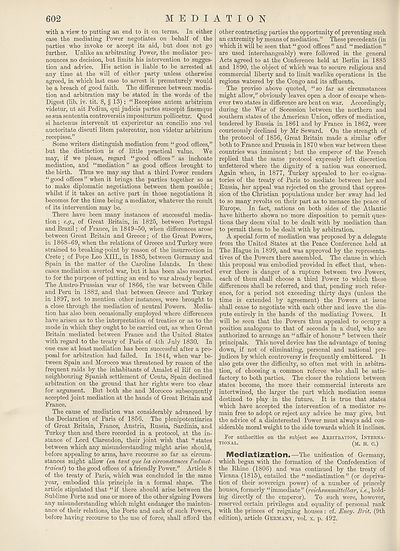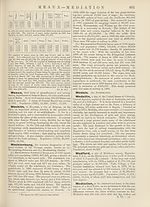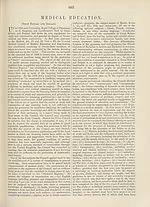New volumes of the Encyclopædia Britannica > Volume 30, K-MOR
(636) Page 602
Download files
Complete book:
Individual page:
Thumbnail gallery: Grid view | List view

MEDIATION
602
with a view to putting an end to it on terms. In either
case the mediating Power negotiates on behalf of the
parties who invoke or accept its aid, but does not go
further. Unlike an arbitrating Power, the mediator pro¬
nounces no decision, but limits his intervention to sugges¬
tion and advice. His action is liable to be arrested at
any time at the will of either party unless otherwise
agreed, in which last case to arrest it prematurely would
be a breach of good faith. The difference between media¬
tion and arbitration may be stated in the words of the
Digest (lib. iv. tit. 8, § 13): “Recepisse autem arbitrium
videtur, ut ait Pedius, qui judicis partes suscepit finemque
se sua sententia controversiis impositurum pollicetur. Quod
si hactenus intervenit ut experiretur an concilio suo vel
auctoritate discuti litem paterentur, non videtur arbitrium
recepisse.”
Some writers distinguish mediation from “ good offices,”
but the distinction is of little practical value. We
may, if we please, regard “good offices” as inchoate
mediation, and “mediation ” as good offices brought to
the birth. Thus we may say that a third Power renders
“ good offices ” when it brings the parties together so as
to make diplomatic negotiations between them possible;
whilst if it takes an active part in those negotiations it
becomes for the time being a mediator, whatever the result
of its intervention may be.
There have been many instances of successful media¬
tion; e.g., of Great Britain, in 1825, between Portugal
and Brazil; of France, in 1849—50, when differences arose
between Great Britain and Greece; of the Great Powers,
in 1868-69, when the relations of Greece and Turkey were
strained to breaking-point by reason of the insurrection in
Crete; of Pope Leo XIII., in 1885, between Germany and
Spain in the matter of the Caroline Islands. In these
cases mediation averted war, but it has been also resorted
to for the purpose of putting an end to war already begun.
The Austro-Prussian war of 1866, the war between Chile
and Peru in 1882, and that between Greece and Turkey
in 1897, not to mention other instances, were brought to
a close through the mediation of neutral Powers. Media¬
tion has also been occasionally employed where differences
have arisen as to the interpretation of treaties or as to the
mode in which they ought to be carried out, as when Great
Britain mediated between France and the United States
with regard to the treaty of Paris of 4th July 1830. In
one case at least mediation has been successful after a pro¬
posal for arbitration had failed. In 1844, when war be¬
tween Spain and Morocco was threatened by reason of the
frequent raids by the inhabitants of Amalet el Rif on the
neighbouring Spanish settlement of Ceuta, Spain declined
arbitration on the ground that her rights were too clear
for argument. But both she and Morocco subsequently
accepted joint mediation at the hands of Great Britain and
France.
The cause of mediation was considerably advanced by
the Declaration of Paris of 1856. The plenipotentiaries
of Great Britain, France, Austria, Russia, Sardinia, and
Turkey then and there recorded in a protocol, at the in¬
stance of Lord Clarendon, their joint wish that “states
between which any misunderstanding might arise should,
before appealing to arms, have recourse so far as circum¬
stances might allow {en tant que les circonstances I’admet-
traient) to the good offices of a friendly Power.” Article 8
of the treaty of Paris, which was concluded in the same
year, embodied this principle in a formal shape. The
article stipulated that “ if there should arise between the
Sublime Porte and one or more of the other signing Powers
any misunderstanding which might endanger the mainten¬
ance of their relations, the Porte and each of such Powers,
before having recourse to the use of force, shall afford the
other contracting parties the opportunity of preventing such
an extremity by means of mediation.” These precedents (in
which it will be seen that “ good offices ” and “ mediation ”
are used interchangeably) were followed in the general
Acts agreed to at the Conference held at Berlin in 1885
and 1890, the object of which was to secure religious and
commercial liberty and to limit warlike operations in the
regions watered by the Congo and its affluents.
The proviso above quoted, “so far as circumstances
might allow,” obviously leaves open a door of escape when¬
ever two states in difference are bent on war. Accordingly,
during the War of Secession between the northern and
southern states of the American Union, offers of mediation,
tendered by Russia in 1861 and by France in 1862, were
courteously declined by Mr Seward. On the strength of
the protocol of 1856, Great Britain made a similar offer
both to France and Prussia in 1870 when war between these
countries was imminent; but the emperor of the French
replied that the same protocol expressly left discretion
unfettered where the dignity of a nation was concerned.
Again when, in 1877, Turkey appealed to her co-signa¬
tories of the treaty of Paris to mediate between her and
Russia, her appeal was rejected on the ground that oppres¬
sion of the Christian populations under her sway had led
to so many revolts on their part as to menace the peace of
Europe. In fact, nations on both sides of the Atlantic
have hitherto shown no more disposition to permit ques¬
tions they deem vital to be dealt with by mediation than
to permit them to be dealt with by arbitration.
A special form of mediation was proposed by a delegate
from the United States at the Peace Conference held at
The Hague in 1899, and was approved by the representa¬
tives of the PoAvers there assembled. The clause in which
this proposal was embodied provided in effect that, when¬
ever there is danger of a rupture between two Powers,
each of them shall choose a third Power to which these
differences shall be referred, and that, pending such refer¬
ence, for a period not exceeding thirty days (unless the
time is extended by agreement) the Powers at issue
shall cease to negotiate with each other and leave the dis¬
pute entirely in the hands of the mediating Powers. It
Avill be seen that the Powers thus appealed to occupy a
position analogous to that of seconds in a duel, who are
authorized to arrange an “ affair of honour ” between their
principals. This novel device has the advantage of toning
down, if not of eliminating, personal and national pre¬
judices by which controversy is frequently embittered. It
also gets over the difficulty, so often met with in arbitra¬
tion, of choosing a common referee who shall be satis¬
factory to both parties. The closer the relations between
states become, the more their commercial interests are
intertwined, the larger the part which mediation seems
destined to play in the future. It is true that states
which have accepted the intervention of a mediator re¬
main free to adopt or reject any advice he may give, but
the advice of a disinterested Power must always add con¬
siderable moral Aveight to the side towards which it inclines.
For authorities on the subject see Arbitration; Interna¬
tional. (M. h. c.)
Mediatization.—The unification of Germany,
which began with the formation of the Confederation of
the Rhine (1806) and was continued by the treaty of
Vienna (1815), entailed the “mediatization” (or depriva¬
tion of their sovereign power) of a number of princely
houses, formerly “immediate” (reichsunmittelbar, i.e., hold¬
ing directly of the emperor). To such were, however,
reserved certain privileges and equality of personal rank
with the princes of reigning houses : cf. Ency. Brit. (9th
edition), article Germany, vol. x. p. 492.
602
with a view to putting an end to it on terms. In either
case the mediating Power negotiates on behalf of the
parties who invoke or accept its aid, but does not go
further. Unlike an arbitrating Power, the mediator pro¬
nounces no decision, but limits his intervention to sugges¬
tion and advice. His action is liable to be arrested at
any time at the will of either party unless otherwise
agreed, in which last case to arrest it prematurely would
be a breach of good faith. The difference between media¬
tion and arbitration may be stated in the words of the
Digest (lib. iv. tit. 8, § 13): “Recepisse autem arbitrium
videtur, ut ait Pedius, qui judicis partes suscepit finemque
se sua sententia controversiis impositurum pollicetur. Quod
si hactenus intervenit ut experiretur an concilio suo vel
auctoritate discuti litem paterentur, non videtur arbitrium
recepisse.”
Some writers distinguish mediation from “ good offices,”
but the distinction is of little practical value. We
may, if we please, regard “good offices” as inchoate
mediation, and “mediation ” as good offices brought to
the birth. Thus we may say that a third Power renders
“ good offices ” when it brings the parties together so as
to make diplomatic negotiations between them possible;
whilst if it takes an active part in those negotiations it
becomes for the time being a mediator, whatever the result
of its intervention may be.
There have been many instances of successful media¬
tion; e.g., of Great Britain, in 1825, between Portugal
and Brazil; of France, in 1849—50, when differences arose
between Great Britain and Greece; of the Great Powers,
in 1868-69, when the relations of Greece and Turkey were
strained to breaking-point by reason of the insurrection in
Crete; of Pope Leo XIII., in 1885, between Germany and
Spain in the matter of the Caroline Islands. In these
cases mediation averted war, but it has been also resorted
to for the purpose of putting an end to war already begun.
The Austro-Prussian war of 1866, the war between Chile
and Peru in 1882, and that between Greece and Turkey
in 1897, not to mention other instances, were brought to
a close through the mediation of neutral Powers. Media¬
tion has also been occasionally employed where differences
have arisen as to the interpretation of treaties or as to the
mode in which they ought to be carried out, as when Great
Britain mediated between France and the United States
with regard to the treaty of Paris of 4th July 1830. In
one case at least mediation has been successful after a pro¬
posal for arbitration had failed. In 1844, when war be¬
tween Spain and Morocco was threatened by reason of the
frequent raids by the inhabitants of Amalet el Rif on the
neighbouring Spanish settlement of Ceuta, Spain declined
arbitration on the ground that her rights were too clear
for argument. But both she and Morocco subsequently
accepted joint mediation at the hands of Great Britain and
France.
The cause of mediation was considerably advanced by
the Declaration of Paris of 1856. The plenipotentiaries
of Great Britain, France, Austria, Russia, Sardinia, and
Turkey then and there recorded in a protocol, at the in¬
stance of Lord Clarendon, their joint wish that “states
between which any misunderstanding might arise should,
before appealing to arms, have recourse so far as circum¬
stances might allow {en tant que les circonstances I’admet-
traient) to the good offices of a friendly Power.” Article 8
of the treaty of Paris, which was concluded in the same
year, embodied this principle in a formal shape. The
article stipulated that “ if there should arise between the
Sublime Porte and one or more of the other signing Powers
any misunderstanding which might endanger the mainten¬
ance of their relations, the Porte and each of such Powers,
before having recourse to the use of force, shall afford the
other contracting parties the opportunity of preventing such
an extremity by means of mediation.” These precedents (in
which it will be seen that “ good offices ” and “ mediation ”
are used interchangeably) were followed in the general
Acts agreed to at the Conference held at Berlin in 1885
and 1890, the object of which was to secure religious and
commercial liberty and to limit warlike operations in the
regions watered by the Congo and its affluents.
The proviso above quoted, “so far as circumstances
might allow,” obviously leaves open a door of escape when¬
ever two states in difference are bent on war. Accordingly,
during the War of Secession between the northern and
southern states of the American Union, offers of mediation,
tendered by Russia in 1861 and by France in 1862, were
courteously declined by Mr Seward. On the strength of
the protocol of 1856, Great Britain made a similar offer
both to France and Prussia in 1870 when war between these
countries was imminent; but the emperor of the French
replied that the same protocol expressly left discretion
unfettered where the dignity of a nation was concerned.
Again when, in 1877, Turkey appealed to her co-signa¬
tories of the treaty of Paris to mediate between her and
Russia, her appeal was rejected on the ground that oppres¬
sion of the Christian populations under her sway had led
to so many revolts on their part as to menace the peace of
Europe. In fact, nations on both sides of the Atlantic
have hitherto shown no more disposition to permit ques¬
tions they deem vital to be dealt with by mediation than
to permit them to be dealt with by arbitration.
A special form of mediation was proposed by a delegate
from the United States at the Peace Conference held at
The Hague in 1899, and was approved by the representa¬
tives of the PoAvers there assembled. The clause in which
this proposal was embodied provided in effect that, when¬
ever there is danger of a rupture between two Powers,
each of them shall choose a third Power to which these
differences shall be referred, and that, pending such refer¬
ence, for a period not exceeding thirty days (unless the
time is extended by agreement) the Powers at issue
shall cease to negotiate with each other and leave the dis¬
pute entirely in the hands of the mediating Powers. It
Avill be seen that the Powers thus appealed to occupy a
position analogous to that of seconds in a duel, who are
authorized to arrange an “ affair of honour ” between their
principals. This novel device has the advantage of toning
down, if not of eliminating, personal and national pre¬
judices by which controversy is frequently embittered. It
also gets over the difficulty, so often met with in arbitra¬
tion, of choosing a common referee who shall be satis¬
factory to both parties. The closer the relations between
states become, the more their commercial interests are
intertwined, the larger the part which mediation seems
destined to play in the future. It is true that states
which have accepted the intervention of a mediator re¬
main free to adopt or reject any advice he may give, but
the advice of a disinterested Power must always add con¬
siderable moral Aveight to the side towards which it inclines.
For authorities on the subject see Arbitration; Interna¬
tional. (M. h. c.)
Mediatization.—The unification of Germany,
which began with the formation of the Confederation of
the Rhine (1806) and was continued by the treaty of
Vienna (1815), entailed the “mediatization” (or depriva¬
tion of their sovereign power) of a number of princely
houses, formerly “immediate” (reichsunmittelbar, i.e., hold¬
ing directly of the emperor). To such were, however,
reserved certain privileges and equality of personal rank
with the princes of reigning houses : cf. Ency. Brit. (9th
edition), article Germany, vol. x. p. 492.
Set display mode to:
![]() Universal Viewer |
Universal Viewer | ![]() Mirador |
Large image | Transcription
Mirador |
Large image | Transcription
Images and transcriptions on this page, including medium image downloads, may be used under the Creative Commons Attribution 4.0 International Licence unless otherwise stated. ![]()
| Encyclopaedia Britannica > New volumes of the Encyclopædia Britannica > Volume 30, K-MOR > (636) Page 602 |
|---|
| Permanent URL | https://digital.nls.uk/193575769 |
|---|
| Attribution and copyright: |
|
|---|---|
| Shelfmark | EB.18 |
|---|---|
| Description | Ten editions of 'Encyclopaedia Britannica', issued from 1768-1903, in 231 volumes. Originally issued in 100 weekly parts (3 volumes) between 1768 and 1771 by publishers: Colin Macfarquhar and Andrew Bell (Edinburgh); editor: William Smellie: engraver: Andrew Bell. Expanded editions in the 19th century featured more volumes and contributions from leading experts in their fields. Managed and published in Edinburgh up to the 9th edition (25 volumes, from 1875-1889); the 10th edition (1902-1903) re-issued the 9th edition, with 11 supplementary volumes. |
|---|---|
| Additional NLS resources: |
|

